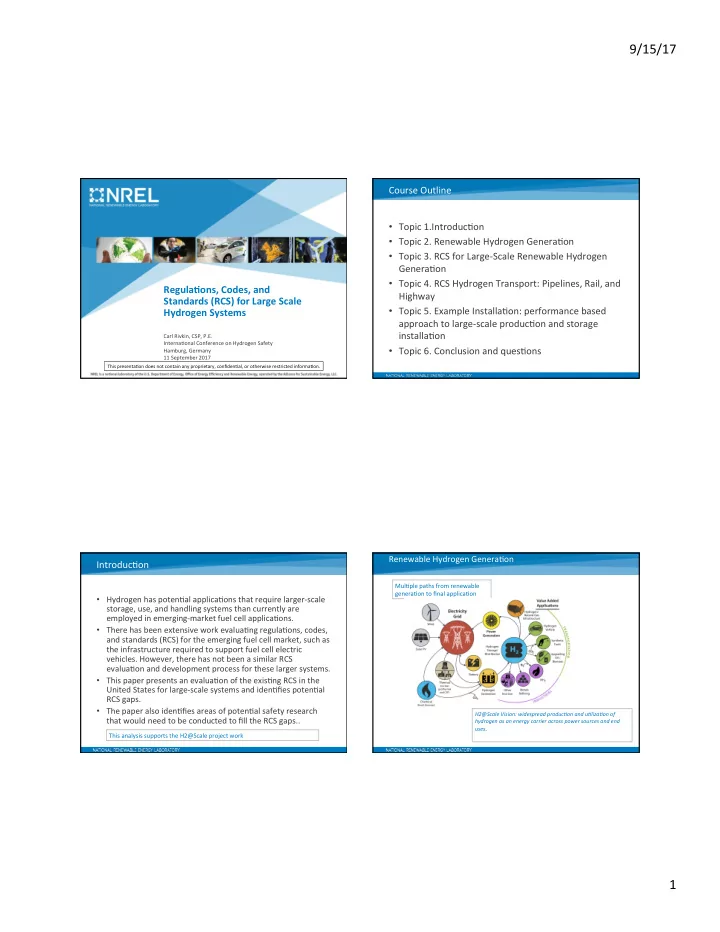

9/15/17 Course Outline • Topic 1.Introduc8on • Topic 2. Renewable Hydrogen Genera8on • Topic 3. RCS for Large-Scale Renewable Hydrogen Genera8on • Topic 4. RCS Hydrogen Transport: Pipelines, Rail, and Regula'ons, Codes, and Highway Standards (RCS) for Large Scale • Topic 5. Example Installa8on: performance based Hydrogen Systems approach to large-scale produc8on and storage installa8on Carl Rivkin, CSP, P.E. Interna8onal Conference on Hydrogen Safety • Topic 6. Conclusion and ques8ons Hamburg, Germany 11 September 2017 This presenta8on does not contain any proprietary, confiden8al, or otherwise restricted informa8on. Renewable Hydrogen Genera8on Introduc8on Mul8ple paths from renewable genera8on to final applica8on • Hydrogen has poten8al applica8ons that require larger-scale storage, use, and handling systems than currently are employed in emerging-market fuel cell applica8ons. • There has been extensive work evalua8ng regula8ons, codes, and standards (RCS) for the emerging fuel cell market, such as the infrastructure required to support fuel cell electric vehicles. However, there has not been a similar RCS evalua8on and development process for these larger systems. • This paper presents an evalua8on of the exis8ng RCS in the United States for large-scale systems and iden8fies poten8al RCS gaps. • The paper also iden8fies areas of poten8al safety research H2@Scale Vision: widespread produc5on and u5liza5on of that would need to be conducted to fill the RCS gaps.. hydrogen as an energy carrier across power sources and end uses . This analysis supports the H2@Scale project work 1
9/15/17 RCS for Large-Scale Renewable Hydrogen Genera'on NFPA 2 Na8onal Hydrogen Code Chapter 13 of NFPA 2 has fairly limited requirements for produc8on 194 Pages of Hydrogen safety Adopted in Most US jurisdic8ons • Referenced in the 2015 Interna8onal Fire Code Referenced in NFPA 1 Uniform • Fire Code • These two Fire codes are used in almost every jurisdic8on in the US • Federal facili8es o_en invoke compliance with NFPA requirements • Covers almost all aspects of hydrogen safety NFPA 2 provides the base for hydrogen technologies including large systems 8 RCS HYDROGEN TRANSPORT: PIPELINES, RAIL, AND RCS FOR LARGE-SCALE HYDROGEN STORAGE SYSTEMS HIGHWAY Current Requirements Excerpt from NFPA 2 bulk liquid Pipeline network is very limited in the US to certain geographic areas storage table • NFPA 2 addresses bulk gaseous storage in unlimited amounts and bulk liquid storage up to 283,906 L (75,000 gallons) • Systems that are larger than current employed by industry may be considered to be outside of the scope of the prescrip8ve requirements in NFPA 2 Hydrogen Technologies Code NFPA 2 give performance-based • op8on 10 2
9/15/17 Example Installa8on: performance based approach to Key Elements of Performance Based Approach large-scale produc8on and storage installa8on Excerpt from summary of performance based The basic parameters: Genera8on Por8on of Schema8c requirements in NFPA 2 Hydrogen • Wind turbines capable of Technologies Code genera8ng megawaas of power • Electrolyzers capable of producing (combined with liquefac8on plant) 5,360 kg/day (20,000 gallons/day) • Storage system capable of holding 26,800 kg (100,000 gallons) of liquid hydrogen • Transport capable of moving 5,360 kg/day (20,000 gallons/day) • Based on fuelling > 1000 vehicles or supplying a small network of sta8ons 12 Key Elements of Performance Based Approach Research Required to Deploy Large Systems • Component performance in large scale storage systems • Very broad open-ended approach with qualita8ve is yet to be demonstrated for some components compliance targets • Electrolyzer oxygen/hydrogen mixtures may present a • Will require data collec8on to evaluate hazards flammability hazard and require more detailed requirements in NFPA 2 • Will require a significant effort to demonstrate • Performance based compliance for systems outside of compliance current boundaries is an area that will require further work • Will require working closely with enforcing authority • Communica8ons for system to perform in an integrated • May be the only way to get large unique systems fashion may require further work approved • Hydrogen Wide Area Monitoring (HyWAM) to detect releases in large storage systems is a technology that needs to be developed and demonstrated 3
9/15/17 CONCLUSION Thank You and Ques8ons • Carl Rivkin, CSP, P.E. - Safety Research Team Lead • Large scale systems not defined in RCS carl.rivkin@nrel.gov • Por8ons of large scale systems may fall outside of the boundaries of current RCS This work is supported by the DOE EERE Fuel Cell Technology Office! • Approval process for these systems may require a performance based approach similar to that applied to large LNG storage systems • No US na8onal system of hydrogen pipelines- filling this gap will require addi8onal safety analyses • Research may be required in characterizing risk and safety measures for large scale systems 17 4
Recommend
More recommend